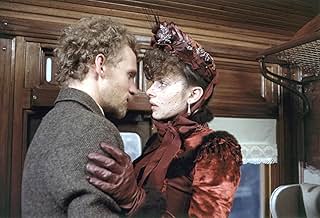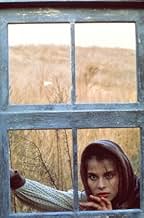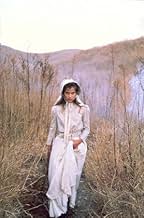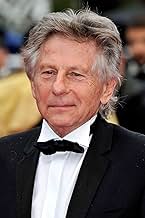CALIFICACIÓN DE IMDb
7.3/10
19 k
TU CALIFICACIÓN
Una joven campesina de carácter fuerte atrae el afecto de dos hombresUna joven campesina de carácter fuerte atrae el afecto de dos hombresUna joven campesina de carácter fuerte atrae el afecto de dos hombres
- Dirección
- Guionistas
- Elenco
- Ganó 3 premios Óscar
- 16 premios ganados y 17 nominaciones en total
Nastassja Kinski
- Tess
- (as Nastassia Kinski)
Opiniones destacadas
Beautiful to look at, not just the scenery but the art direction as well but overlong and somewhat ponderous. Nastassja Kinski handles the complex lead role with surety and exudes a great deal of charisma and star quality, it's surprising that her career fizzled out so completely but as she matured those qualities in evidence here diminished. Director Polanski's silent tribute to his late wife Sharon Tate at the end of the opening credits with a simple "To Sharon" after his credit is quite moving. She had left the Hardy novel with a note that she thought he would make a fine film of it when she headed back to the states just before her death.
This film was an almost exact replication of Thomas Hardy's novel "Tess of the d'Urbervilles". It's so rare to watch a film after reading the novel and not be disappointed by it, but this film didn't disappoint in any way.
Details, such as the whiteness of the maids' dresses, the sound of milk squirting into a bucket, the sloshing mud of a wet English turnip field, and the glint of adoration in the eyes of the young lovers -- all came gloriously to life as if fresh off the pages of the book.
I highly recommend this film for anyone who enjoys a good old fashioned Victorian love story.
Details, such as the whiteness of the maids' dresses, the sound of milk squirting into a bucket, the sloshing mud of a wet English turnip field, and the glint of adoration in the eyes of the young lovers -- all came gloriously to life as if fresh off the pages of the book.
I highly recommend this film for anyone who enjoys a good old fashioned Victorian love story.
In this adaptation of the Hardy novel, a peasant girl who may be descended from a noble family encounters romance and tragedy in 19th century England. Meticulously directed by Polanski, this epic drama unfolds quite leisurely but does not drag. The English countryside is beautifully captured, with the cinematography adding a haunting quality to the barren landscape, an effect further enhanced by the evocative score. Perhaps she does not faithfully embody the strong-willed heroine of the novel, but Kinski (resembling a young Ingrid Bergman) looks exquisite and effectively conveys a sense of melancholy in a star-making performance.
Polanski's 'Tess' is rich with images and poetry. To start with, the director really does make use of the countryside and life in the country during the late 1800s. Those themes are presented as characters themselves. And, coupled with the fitting score it gives a feel of what the time may have been like. Along with some fine cinematography, many of the shots linger on the beautiful and yet sad countryside.
The pacing is exceptionally well maintained. 'Tess' is longer than the traditional 100 minute flick but not for a moment does it feel as though it's lagging or dragging in pace.
Another strength of the film is its subtlety. For example, to the director's credit, there's an outstanding sequence of how murder is implied just with a few drops of blood. Even the finally sequence (beautifully done) implies Tess's fate (before the epilogue clarifies it). 'Tess' touches on some heavy themes such as sexism, poverty and betrayal but it doesn't preach about them. Rather it tells the story of a strong-willed, devoted and kind woman who was faulted for being beautiful.
Moreover, the characters are brilliantly layered. The screenplay has safely avoided caricatures). A very young Nastassja Kinski is incredible in one of her early roles. Her restrained performance and gestural expressions are remarkable. Peter Firth does a fine job too. They are supported by very good performers.
This is easily one of Polanski's finest: his most subtle and poetic films. A treat to watch.
The pacing is exceptionally well maintained. 'Tess' is longer than the traditional 100 minute flick but not for a moment does it feel as though it's lagging or dragging in pace.
Another strength of the film is its subtlety. For example, to the director's credit, there's an outstanding sequence of how murder is implied just with a few drops of blood. Even the finally sequence (beautifully done) implies Tess's fate (before the epilogue clarifies it). 'Tess' touches on some heavy themes such as sexism, poverty and betrayal but it doesn't preach about them. Rather it tells the story of a strong-willed, devoted and kind woman who was faulted for being beautiful.
Moreover, the characters are brilliantly layered. The screenplay has safely avoided caricatures). A very young Nastassja Kinski is incredible in one of her early roles. Her restrained performance and gestural expressions are remarkable. Peter Firth does a fine job too. They are supported by very good performers.
This is easily one of Polanski's finest: his most subtle and poetic films. A treat to watch.
I don't know what's been keeping them but 'Tess' has been overdue for a DVD release for a very long time. At last it's here, and it looks gorgeous, although it hasn't been digitally cleaned up and there are a couple of scratches here and there. It's been worth the wait though, as this is possibly the most beautifully photographed film ever made.
Ever since the release of '2001: A Space Odyssey' I have been fascinated by the work of Stanley Kubrick and his cinematographer on that film, Geoffrey Unsworth. 'Tess' was Unsworth's last work; he died during the filming, and shared his Oscar for this with Ghislain Cloquet, who finished shooting, copying Unsworth's own style. The lighting is subtle and appears beautifully natural: just look at the first five minutes starting with village club dancers walking to the field, John Durbeyfield's fateful meeting with the parson, the arrival of Tess' future husband Angel Clare, with the late summer afternoon shading gradually into evening and darkness and all before we have even identified which girl is Tess. Oh, and that stunning moment when Tess finds her confessional letter to Angel has slipped under the carpet of his room unread, and her stunned realisation is underlined by the wheeling camera shot and the blinding flaring of the sun behind her head suddenly wiping all else off the screen for a moment. Wonderful.
Do yourself a favour and look up Geoffrey Unsworth on the internet movie database the number, quality and range of films he contributed to is astonishing. By all accounts he was a lovely man too, the featurettes underline the terrific camaraderie that existed on the shoot between all the cast and crew, and it is really moving to hear their tributes and memories of Unsworth, particularly Nastassia Kinski fighting back tears as she recalls his death.
In the film, of course, Kinski is absolutely wonderful, just perfect for the role of tragic victim Tess, the 'pure woman' of Hardy's subtitle. Despite comments to the contrary I find her accent quite a commendable attempt at Dorset, having lived and worked there myself, and my wife having been born there. Some of the other accents are generalised country yokel, but Kinski has learned a pretty authentic representation of Dorset's rolling rounded vowels.
I'm also a Hardy fan, and Tess is quite possibly my favourite novel. I remain astonished that Polanski was so successful in transferring it to the screen. The featurettes make it clear the main task of literary adaptation for the screen is cutting things out, yet when I first saw the film I couldn't think of a thing that was missing. That's impossible of course, but the choice of what to film and what to leave out is almost seamless. Perhaps the only serious omission is the passage in the book where Tess feels guilt for inadvertently causing the death of the family horse in a night-time collision with the post-cart, and it is to assuage this guilt that she agrees to visit 'cousin' Alec, which is of course her great undoing. Polanski tried to cut the film to meet the expectations of distributors (and Francis Ford Coppola!) but some idea of his reluctance comes from the disclosure that he took 3 months to cut 20 minutes. I'd love to see a director's cut with that footage restored.
Finally, the background material reveals the bone-headiness of some of those involved in film distribution. The co-producer shows the film to the buyers of the two main IK distributors, and (pre-Oscars) one of them says 'This film will only show in my cinemas over my dead body.' Doesn't that remind you of Decca turning down The Beatles?
Ever since the release of '2001: A Space Odyssey' I have been fascinated by the work of Stanley Kubrick and his cinematographer on that film, Geoffrey Unsworth. 'Tess' was Unsworth's last work; he died during the filming, and shared his Oscar for this with Ghislain Cloquet, who finished shooting, copying Unsworth's own style. The lighting is subtle and appears beautifully natural: just look at the first five minutes starting with village club dancers walking to the field, John Durbeyfield's fateful meeting with the parson, the arrival of Tess' future husband Angel Clare, with the late summer afternoon shading gradually into evening and darkness and all before we have even identified which girl is Tess. Oh, and that stunning moment when Tess finds her confessional letter to Angel has slipped under the carpet of his room unread, and her stunned realisation is underlined by the wheeling camera shot and the blinding flaring of the sun behind her head suddenly wiping all else off the screen for a moment. Wonderful.
Do yourself a favour and look up Geoffrey Unsworth on the internet movie database the number, quality and range of films he contributed to is astonishing. By all accounts he was a lovely man too, the featurettes underline the terrific camaraderie that existed on the shoot between all the cast and crew, and it is really moving to hear their tributes and memories of Unsworth, particularly Nastassia Kinski fighting back tears as she recalls his death.
In the film, of course, Kinski is absolutely wonderful, just perfect for the role of tragic victim Tess, the 'pure woman' of Hardy's subtitle. Despite comments to the contrary I find her accent quite a commendable attempt at Dorset, having lived and worked there myself, and my wife having been born there. Some of the other accents are generalised country yokel, but Kinski has learned a pretty authentic representation of Dorset's rolling rounded vowels.
I'm also a Hardy fan, and Tess is quite possibly my favourite novel. I remain astonished that Polanski was so successful in transferring it to the screen. The featurettes make it clear the main task of literary adaptation for the screen is cutting things out, yet when I first saw the film I couldn't think of a thing that was missing. That's impossible of course, but the choice of what to film and what to leave out is almost seamless. Perhaps the only serious omission is the passage in the book where Tess feels guilt for inadvertently causing the death of the family horse in a night-time collision with the post-cart, and it is to assuage this guilt that she agrees to visit 'cousin' Alec, which is of course her great undoing. Polanski tried to cut the film to meet the expectations of distributors (and Francis Ford Coppola!) but some idea of his reluctance comes from the disclosure that he took 3 months to cut 20 minutes. I'd love to see a director's cut with that footage restored.
Finally, the background material reveals the bone-headiness of some of those involved in film distribution. The co-producer shows the film to the buyers of the two main IK distributors, and (pre-Oscars) one of them says 'This film will only show in my cinemas over my dead body.' Doesn't that remind you of Decca turning down The Beatles?
¿Sabías que…?
- TriviaThe film's opening dedication at the start of the film states: "For Sharon". Roman Polanski dedicated this movie to his late wife, Sharon Tate, who was killed in 1969 by the Manson Clan. Before Tate's death, she had read the film's source novel by Thomas Hardy and was convinced that her husband would one day make a great film based on the novel. Movie was released to the theaters exactly 10 years after her untimely death.
- ErroresAt the beginning of the final sequence, set at Stonehenge, someone's head can be seen at bottom-left.
- Versiones alternativasThe film was first released to German cinemas uncut with a running time of 184 minutes. As the audience reaction was far from overwhelming the distributor decided to re-cut and re-release the film in a more "accessible" 134 minutes version. But at least one of the original prints had survived and was shown here at the local art house years later.
- ConexionesFeatured in The 38th Annual Golden Globe Awards (1981)
Selecciones populares
Inicia sesión para calificar y agrega a la lista de videos para obtener recomendaciones personalizadas
- How long is Tess?Con tecnología de Alexa
Detalles
- Fecha de lanzamiento
- Países de origen
- Idioma
- También se conoce como
- Cô Gái Đức Hạnh
- Locaciones de filmación
- Productoras
- Ver más créditos de la compañía en IMDbPro
Taquilla
- Presupuesto
- USD 12,000,000 (estimado)
- Total en EE. UU. y Canadá
- USD 20,093,330
- Total a nivel mundial
- USD 20,101,247
- Tiempo de ejecución3 horas 6 minutos
- Color
- Relación de aspecto
- 2.35 : 1
Contribuir a esta página
Sugiere una edición o agrega el contenido que falta

Principales brechas de datos
By what name was Tess (1979) officially released in India in Hindi?
Responda

































